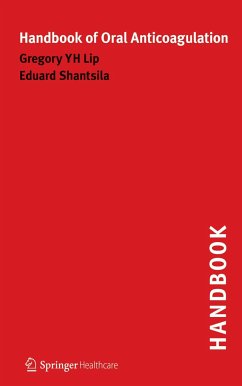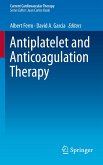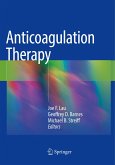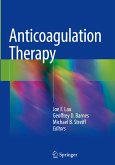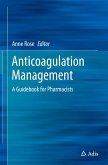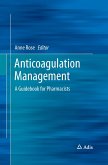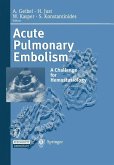- Broschiertes Buch
- Merkliste
- Auf die Merkliste
- Bewerten Bewerten
- Teilen
- Produkt teilen
- Produkterinnerung
- Produkterinnerung
An overview of the new oral warfarin alternatives, an important new area in therapy for cardiovascular disease, provided by a leading expert.
Presented in a concise format Authored by a well-known expert Provides a user-friendly overview of the most important clinical trials
Andere Kunden interessierten sich auch für
![Antiplatelet and Anticoagulation Therapy Antiplatelet and Anticoagulation Therapy]() Antiplatelet and Anticoagulation Therapy33,99 €
Antiplatelet and Anticoagulation Therapy33,99 €![Anticoagulation Therapy Anticoagulation Therapy]() Anticoagulation Therapy106,99 €
Anticoagulation Therapy106,99 €![Anticoagulation Therapy Anticoagulation Therapy]() Anticoagulation Therapy162,99 €
Anticoagulation Therapy162,99 €![Anticoagulation Management Anticoagulation Management]() Anticoagulation Management41,99 €
Anticoagulation Management41,99 €![Anticoagulation Management Anticoagulation Management]() Anticoagulation Management41,99 €
Anticoagulation Management41,99 €![Acute Pulmonary Embolism Acute Pulmonary Embolism]() Acute Pulmonary Embolism41,99 €
Acute Pulmonary Embolism41,99 €![The New Dimensions of Warfarin Prophylaxis The New Dimensions of Warfarin Prophylaxis]() The New Dimensions of Warfarin Prophylaxis42,99 €
The New Dimensions of Warfarin Prophylaxis42,99 €-
-
-
An overview of the new oral warfarin alternatives, an important new area in therapy for cardiovascular disease, provided by a leading expert.
Presented in a concise format
Authored by a well-known expert
Provides a user-friendly overview of the most important clinical trials
Presented in a concise format
Authored by a well-known expert
Provides a user-friendly overview of the most important clinical trials
Produktdetails
- Produktdetails
- Verlag: Springer Healthcare / Springer Healthcare Ltd. / Springer, Berlin
- Artikelnr. des Verlages: 978-1-85873-452-1
- 2010
- Seitenzahl: 84
- Erscheinungstermin: 16. Januar 2012
- Englisch
- Abmessung: 203mm x 127mm x 6mm
- Gewicht: 108g
- ISBN-13: 9781858734521
- ISBN-10: 1858734525
- Artikelnr.: 33867117
- Herstellerkennzeichnung Die Herstellerinformationen sind derzeit nicht verfügbar.
- Verlag: Springer Healthcare / Springer Healthcare Ltd. / Springer, Berlin
- Artikelnr. des Verlages: 978-1-85873-452-1
- 2010
- Seitenzahl: 84
- Erscheinungstermin: 16. Januar 2012
- Englisch
- Abmessung: 203mm x 127mm x 6mm
- Gewicht: 108g
- ISBN-13: 9781858734521
- ISBN-10: 1858734525
- Artikelnr.: 33867117
- Herstellerkennzeichnung Die Herstellerinformationen sind derzeit nicht verfügbar.
Professor Gregory YH Lip is Professor of Cardiovascular Medicine at the University of Birmingham, and Visiting Professor of Haemostasis, Thrombosis and Vascular Sciences in the School of Life and Health Sciences at the University of Aston in Birmingham, UK. Professor Lip is a member of the scientific documents committee of the European Heart Rhythm Association (EHRA), and serves on the board of the Working Group on Hypertension of the Heart of the European Society of Cardiology (ESC). He is also a member of the Working Groups of Thrombosis and Cardiovascular Pharmacology of the ESC. Professor Lip has acted as Clinical Adviser for the UK National Institute for Health and Clinical Excellence (NICE) guidelines on atrial fibrillation (AF) management. He was on the writing committee for the 8th American College of Chest Physicians (ACCP) Antithrombotic Therapy Guidelines for Atrial Fibrillation, as well as various guidelines and/or position statements from the EHRA, including the EHRA statement on defining endpoints for AF management, EHRA guidelines for antithrombotic therapy during ablation. He is also on the writing committee for the 2010 ESC Guidelines on Atrial Fibrillation and will be Deputy Editor for the 9th ACCP guidelines on antithrombotic therapy for AF. Professor Lip is involved at senior editorial level in major international journals, including Journal of Human Hypertension (Editor in Chief), Thrombosis & Haemostasis (Editor in Chief [Clinical Studies] designate), Thrombosis Research (Associate Editor), Europace (Associate Editor) and Circulation(Guest Editor). He has published and lectured extensively on thrombosis and antithrombotic disease in cardiovascular disease. Dr Eduard Shantsila is a Postdoctorate Research Fellow at the University of Birmingham Centre for Cardiovascular Science, City Hospital, Birmingham, UK, where he leads a research group working on a number of research projects that investigate endothelial damage/recovery, and monocyte characteristics including their role in thrombosis in patients with acute coronary syndromes, heart failure, and systemic atherosclerosis. Dr Shantsila worked in the Republican Research and Practical Centre 'Cardiology', insk, Belarus, as a researcher and a cardiologist from 1998 and completed his MD thesis in 2002. From 2005 to 2008 he was a head of the Department of Urgent Cardiology in this centre, where he was actively involved in research work on the problems of cardiovascular diagnostics, endothelial dysfunction and thrombosis. He is a member of the Working Group of Thrombosis of the European Society of Cardiology. Dr Shantsila has published extensively on these topics, and is a peer reviewer of major journals in thrombosis.
The coagulation pathway and approaches to anticoagulation.- Common clinical indications for anticoagulation.- The vitamin K antagonists and their limitations.- Haemorrhage risks, patient perspectives, and quality-of-life issues.- New oral anticoagulants.- Future directions.
The coagulation pathway and approaches to anticoagulation.- Common clinical indications for anticoagulation.- The vitamin K antagonists and their limitations.- Haemorrhage risks, patient perspectives, and quality-of-life issues.- New oral anticoagulants.- Future directions.

